Please Take Note: This is a review of the final game, but it might change slightly based on the success of the Kickstarter campaign. The game is being reviewed on the components and the rules provided with the understanding that “what you see is not what you might get” when the game is published. If you like what you read and want to learn more, we encourage you to visit the game’s web page or visit the Kickstarter campaign. Now that we have all that disclaimer junk out of the way, on with the review.
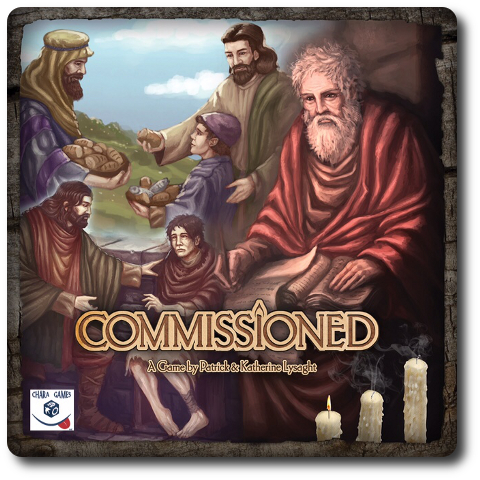
The Basics:
- For ages 7 and up (publisher suggests 13+)
- For 2 to 6 players
- Approximately 60 minutes to complete
Geek Skills:
- Active Listening & Communication
- Counting & Math
- Logical & Critical Decision Making
- Reading
- Strategy & Tactics
- Risk vs. Reward
- Cooperative & Team Play
- Hand/Resource Management
- Worker Placement & Area Control
Learning Curve:
- Child – Easy
- Adult – Easy
Theme & Narrative:
- Walk the path of an Apostle in a hostile land
Endorsements:
- Gamer Geek rejected!
- Parent Geek approved!
- Child Geek approved!
Overview
Persecution is rampant. The Jewish authorities and the Roman Legion search the land for followers of the troublemaker known as “Jesus”. You are a disciple and have been tasked to spread the teachings of Jesus across the land, establishing churches, and leading followers. But the powers that be fear you and the message you spread. With the help of other Apostles, you must journey on a path paved with trials and tribulations, for it is your calling…
Commissioned, designed by Patrick Lysaght and to be published by Chara Games, will reportedly be comprised of 1 double-sided game board, 5 Scenario cards, 6 Apostle pawns, 6 Apostle boards, 4 Missionary meeples, 75 Church Member cubes, 15 Growth Stop tokens, 15 Mission Stop tokens, 1 standard eight-sided die, 1 Converted City Leaders token, 1 Elder Staff game piece, 5 Extinguished tokens, 27 Trial cards, 36 “Apostle” Faith cards, 60 “General” Faith cards, and 1 Roman Legion token. As this is a review of a prepublished game, I will not comment on the game component quality. The proposed final artwork and what was provided was good enough to further strengthen the game’s theme and narrative.
With Signs and Wonders and Mighty Works
To set up the game, first select 1 Scenario card. Each Scenario card lists special set up instructions, special rules, victory conditions, and the consequences of failure. The Scenario card also provides a brief summary of Biblical events that are being represented within the scenario. The Scenario cards can be played in chronological order or randomly selected. It’s suggested that new players select the “Acts of the Apostles” Scenario card first. The selected Scenario card is placed on the table for reference, while the rest of the Scenario cards are returned to the game box.
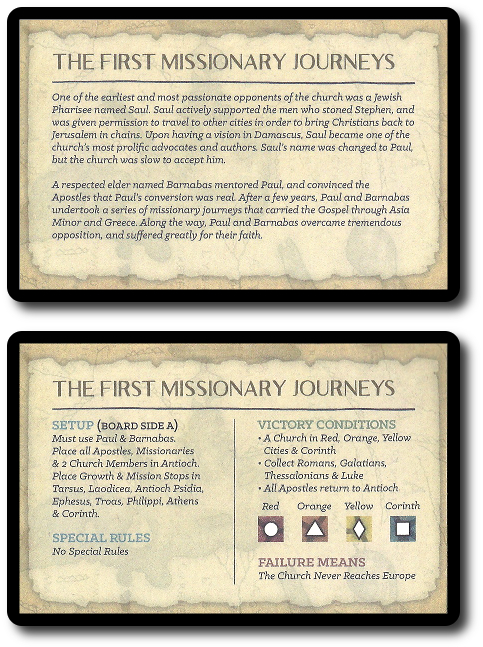
Second, have each player select 1 Apostle board and take the matching Apostle pawn and “Apostle” Faith cards. Each Apostle board has a special ability listed. These match the abilities provided by the “Apostle” Faith cards. Players should take a moment to review what each Apostle provides before they randomly select an Apostle board to ensure the players have a good chance of winning the game.
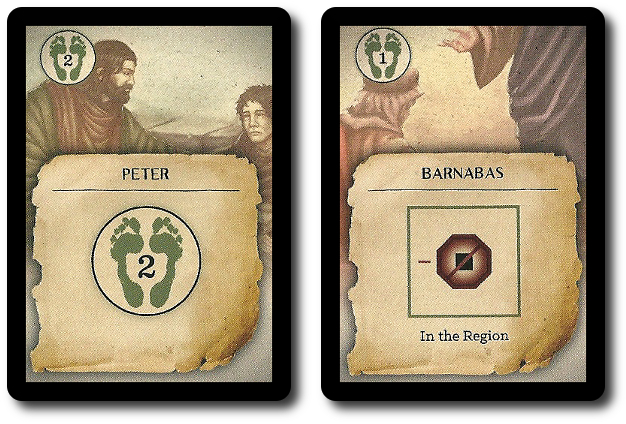
Peter always provides 2 Faith Points and Barnabas removes obstacles that stop the Church from growing
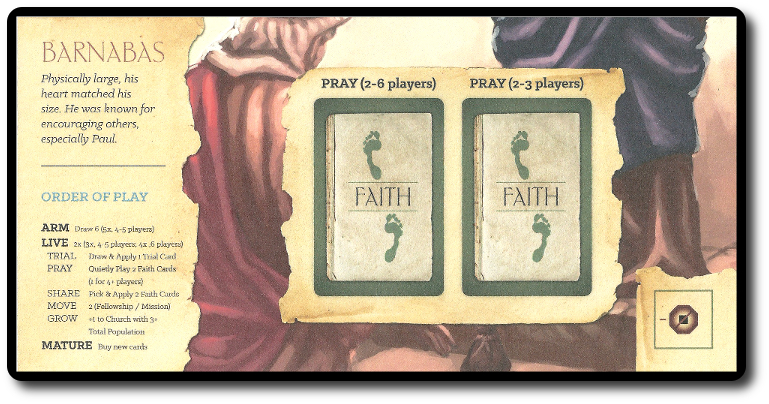
Barnabas’ ability to remove obstacles is also printed on the Apostle game board
Note: Some Scenario cards list Apostles that must be selected (any player may play these). Any Apostle boards, pawns, and Faith cards not selected are returned to the game box.
Third, place the game board in the middle of the playing area, using the side (side “A” and “B” respectively) identified by the Scenario card. Then place the Apostle pawns on the stating area of the game board as directed by the Scenario card.
Fourth, the Scenario card will list the number of starting Church Member cubes and where they should be placed on the game board. These are placed now with all remaining Church Member cubes placed on the “Loaf of Bread” image on the game board.
Fifth, the Scenario card will identify where Missionary meeples should be placed. Missionary meeples act as stand-ins for missing players, ensuring the players always have enough support to tackle (but not necessary succeed) the Trials to come. The number of Missionary meeples that are places is equal to “6” minus the number of players. For example, if there are “4” players in the game, then “2” Missionary meeples would be used (6 – 4 = 2). Any Missionary meeples not used are returned to the game box.
Sixth, sort the Trial cards by difficulty. There are two levels of difficulty. The easiest is referred to as “Disciple” and the more difficult is referred to as “Martyr”. There are icons for each on the Trial cards. Some Trial cards show both icons, meaning they are always used. Once the Trial cards are divided, the players will have 21 Trial cards in total. Any Trial cards not used are returned to the game box. In addition, 1 Trial card is removed from play for every additional player above 3. The Trial cards are shuffled and placed face-down in the Trial draw area on the game board. This is the Trial draw deck for the duration of the game.
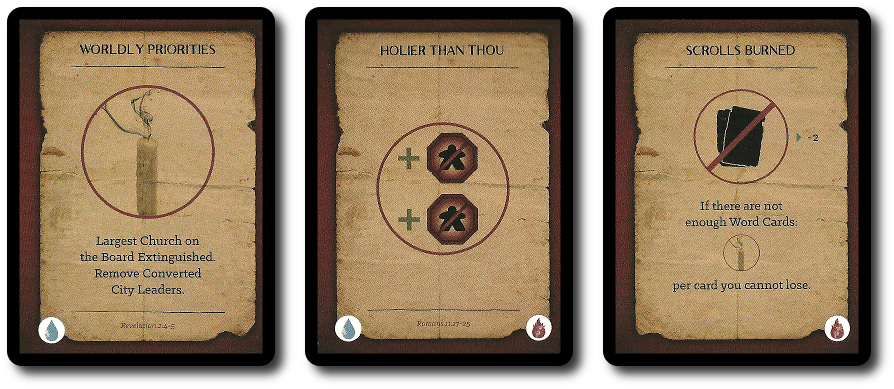
From left to right: Disciple, Disciple/Martyr, Martyr
Seventh, stack the Extinguished tokens in numerical order with “1” on top. These tokens are placed on the “Wine Goblet” image on the game board.
Eighth, sort the “General” Faith cards by their number value into different piles. Shuffle each pile separately and place them face-down (or face-up, the rules were not clear) above the game board next to their designated edge. This is the Faith draw decks. Give each player 2 “2-Faith” Faith card to add to their “Apostle” Faith cards. All players should now shuffle their Faith cards and place them on their Apostle boards, face-down.
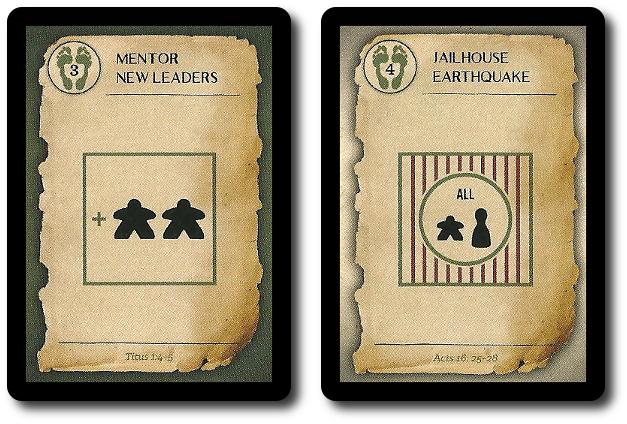
That’s it for game set up. Determine who will be the first player and give them the Elder Staff game piece and the eight-sided die.
They Will Speak in New Tongues
Commissioned is a Cooperative game, meaning all the players work together to win. Even though each round has a dominant player (referred to as the “Elder”), all the players are as equally as important. Communication is key to success, as there is a great deal of logistical organization, threat management, and risk reduction that must take place in the game.
To thematically portray the difficulty of communicating during 34 AD (no cell phone, kids), the eight-sided die is used to determine how well messages are delivered and received. The best possible outcome is a roll that results in no issues with communication. The worst restricts communication between all the players, causing nothing but confusion.
During the game, the players will independently determine how best to help the group achieve victory. Later in the same round, they might be able to cooperatively discuss, debate, and collectively agree on what actions should be taken. On the other end of the spectrum, the players might not be able to speak to each other, with no way to collectively tackle the most pressing challenges. Worse yet, there might be some very serious consequences to not being able to collaborate. For example, losing Church Member cubes, Missionary meeples, or being stopped from moving locations.
Optionally, players can avoid using the die to determine if communication is or is not possible. This is the recommended course of action for new players, resulting in open communication throughout the entire game.
Go You into All the World
Commissioned is played in rounds with no set number of rounds of play. Each round is broken down into 3 phases. A typical round of game play is summarized here.
Phase 1: Arm
All players draw 6 cards from the Faith draw deck (only draw 5 cards for a 4 and 5-player game). If their Faith draw deck is exhausted, shuffle the player’s Faith discard pile to create a new Faith draw deck. If you are familiar with deck-building games, this type of game mechanism should be familiar to you.
Each player starts with “Apostle” Faith cards that are unique in the game. They provide the player (and the player’s partners) Apostle specific abilities and actions. Any player can quickly determine what an Apostle provides by looking at the Apostle board.
Players should look at their cards, but keep them hidden until played.
Phase 2: Live
This is the most active phase for all the players and consists of several actions and sub-actions. This phase is also repeated several times before phase 3 is started. As such, I have listed the actions and sub-actions in sequential order to make it a bit easier to understand the game flow. For 2 to 3-player games, this phase is repeated twice; for 4 to 5-player games, this phase is repeated thrice; and for a 6-player game, this phase is repeated four times.
Action 1: Face Your Trial
At the top of each second phase, a new Trial card is drawn. Trial cards represent the ongoing strife, political complications, and religious persecution happening in the part of the world where the Apostles are working. However, the effects of the Trial card only affect the location of the “Elder” player. The Elder Staff game piece is passed around during the game, randomizing who is the primary decision maker in the group and the target of the Trial cards.
The Trial card will show one or more icons that represents the effect to be taken. Again, only the area in which the player who is currently identified as the “Elder” must take action on the Trial card and gets to decide how best to resolve the Trial card. Input can be given by the other players, of course. If part of all of the Trial card cannot be resolved, then nothing happens. After the Trial card is (or is not) resolved, it’s discarded face-up.
Action 2: Pray
All those Faith cards the player is holding now come into play. The Trial cards are designed to hinder and reduce the chances of the players winning the game. The Faith cards are the brick and mortar the players use to build, repair, and strengthen their position in an attempt to achieve victory. Each player will now select 2 Faith cards that they believe will help reduce threats, fight proverbial fires, and move the group ever closer to victory. The trick is, the players must do this without talking. The 2 Faith cards (or 1 Faith card if playing a 4 to 6-player game) selected are placed face-down on the Apostle board.
The players now roll the die to determine if they can communicate during the next actions of the phase. If the players have decided to not leave things to chance, rolling the die is unnecessary. Whatever the roll result might be, it influences the rest of the phase, but only lasts till the end of the phase. Once the phase is repeated or the game moves to phase 3, the effects are removed.
Action 3: Share
The played Faith cards are now turned face-up and the player currently in possession of the Elder Staff game piece gets to decide which 2 of all the Faith cards to use. The other players may or may not be able to participate in the decision making if the die was used to determine if players could communicate or not. If the die allows it or the players ignore the die altogether, everyone can be part of this process.
If allowed, players should provide advice, suggest pros and cons to certain Faith cards, point out important combos, and not-so-obvious pitfalls. Ultimately, the player with the Elder Staff game piece is the decision maker for the phase. They can listen to the advise of others, but do not need to follow it.
Like the Trail card, the effects of the selected Faith cards only impact the area where the player with the Elder Staff game piece is on the game board. Once the Faith cards are selected and resolved, they are returned to the owning players and discarded unless they are played to the “New Testament”.
Action 4: Move
The Elder player isn’t done yet. As the de facto leader, they must decide how best to organize and position everyone to further their goals. The Elder player has 2 move actions they can take. Of course, the other players can offer advise, but the Elder player is the one who gets to make the final decision. All movement is done by tracing routes between locations. A location connected to another location via a route is referred to as being “adjacent”. Moving from one location to another counts as a single move action. What is moved is dependent on the type of move action.
The “Fellowship” move action allows the player to move any number of Apostle pawns, Missionary meeples, and Church Member cubes from one location to an adjacent location. The move is one big “mass move”, but the Elder player can leave Apostles, Missionaries, and Church Members behind to secure the area. For example, if all the pawns, meeples, and cubes are removed from a location, that location no longer has an established Church. In essence, the players have lost the location.
The “Mission” move action is similar to the “Fellowship” move action, but with restrictions. If the Elder player wants to move into a location where there are currently no Apostle pawns, Missionary meeples, or Church Member cubes, they must move a mix of at least 4 pieces into the new location to establish a Church foothold. At least 1 of the 4 pieces moved must be an Apostle pawn or a Missionary meeple. If the Mission Stop effect is in play, the Elder player cannot move game pieces into new locations that are not already populated with Apostles, Missionaries, or Church Members.
The “Ship” move action requires the same accompaniment of game pieces as a “Mission” or “Fellowship” move action, depending on what the Elder player is moving the game pieces to. Ship routes connect different locations across water and are a fast way of moving great distances. However, moving by Ship takes all 2 of the Elder players move actions. The first is boarding the Ship at the location where the game pieces are located. The second is disembarking from the Ship and placing the game pieces in their new location.
Action 5: Grow
Finally, the Elder player must decide which Church grows. Any grouping of 3 or more Church Member cubes can grow by 1 Church Member cube. The Church Member cubes are taken from the “Bread” image on the game board and placed in the location identified by the Elder as a growing Church. This is optional. The Elder player can decide not to grow a Church if they think doing so would put the larger goals in jeopardy.
After the Churches have grown, the Elder player passes the Elder Staff game piece to the next player in the turn order sequence. This player is the new Elder player and will be making the decisions during the next Live phase. If the Live phase needs to be repeated again, start at with Action 1: Face Your Trial and continue. If the Live phase has been repeated the required number of times, the new Elder player keeps the staff for now and the game moves to phase 3.
Phase 3: Mature
The players now attempt to improve their personal Faith deck by purchasing additional Faith cards. Those Faith cards not played during the round are used as a sort of currency. Each Faith card provides a certain number of Faith Points. These are added together to give the player the total number of Faith Points they can spend. The player can spend their Faith Points anyway they like, buying 1 or more Faith cards if they have enough Faith Points available. If the player only buys 1 Faith card, they take the top 2 Faith cards that match the Faith Points being spent, select 1, and put the other on the bottom of the Faith draw deck. If purchasing more than one from a Faith draw deck, the player take the number purchased right from the top.
A player is never required to purchase Faith cards if they do not want to, but nor can they bank Faith Points for later use in the game. Use ’em or lose ’em. Once Faith cards are purchased, all the Faith cards in the player’s hand and the newly acquired Faith cards are sent to their discard pile.
This ends the round. The game continues with a new round full of trials and tribulations to overcome. Unless, of course, the players have won or lost.
To Still the Enemy and the Avenger
The game can end several different ways.
If the players are able to complete the victory conditions listed on the Scenario card, they have won the game.
The players lose if all 5 of the Church Candles are snuffed out. A Church Candle is extinguished when the last Apostle, Missionary, or Church Member is removed from a location. Essentially, the Church and the teachings of Jesus fail to take root in that location. An Extinguished token is taken and placed on top of one of the Church Candles on the game board. Players should be careful when moving Apostles, Missionaries, and Church Members during their move actions and attempt to reduce the possibility of losing a Church through Trial cards.
The players can also lose if the last Trial card is drawn and the players have not successfully completed their Scenario victory condition by the end of the Live phase. The players have run out of time and opposing forces overwhelm the Apostles.
Game Variant
Commissioned is a cooperative game at its core. It’s always the players against the game. This can become stale after a time, especially for those players who already work very well as a group. If additional difficulty is needed or a brief change of pace, the Adversary game variant can be used. This assigns one player all the power of Rome and the ability to decide which Trial cards are played. As the Adversary marches the Roman army, they hinder the Apostles and the growth of their movement. The Adversary wins the game if the Apostles lose. This game variant reduces the amount of randomness in the game and pits the Apostles against an intelligent enemy. I suggest you do NOT use the “Martyr” Trial cards unless you are looking for a serious challenge.
To learn more about Commissioned, visit the game’s web page or visit the Kickstarter campaign.
Final Word
The Child Geeks liked the game, especially when they played it with their parents. For those Child Geeks who attended Sunday School and were members of families who attended Church regularly, many of the names and stories were familiar. Which, it must be stated, didn’t make any difference. Those Child Geeks who were not familiar with the Bible had no problems playing the game and those who did had no advantage. According to one Child Geek, “It’s neat to know who the people are in the game and the places, but it doesn’t help me play the game.” All the Child Geeks wanted to help each other out and understood the importance of working together. The most difficult time for a Child Geek was when they were the Elder and had to make some tough decisions. As one Child Geek put it, “It can be really hard sometimes. One friend will tell you to do this and another friend will tell you to do something else. I just don’t want to make people angry.” While the sentiment is of value, it did not hinder the Child Geeks from driving forward. Conflicting ideas were quickly resolved to move the game along. When all the games were over, the Child Geeks voted to approve the game.
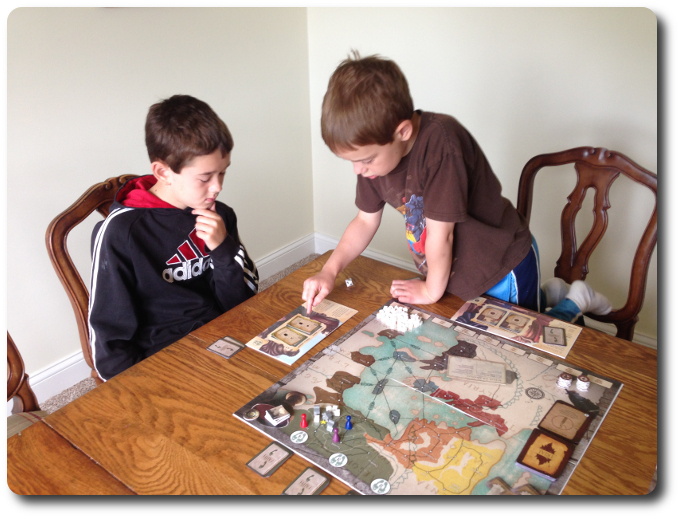
The two Apostles discuss their strategy
The Parent Geeks appreciated the game play more than the game’s theme. One Parent Geek said that Commissioned reminded them a great deal of Pandemic, except in Commissioned you wanted the cubes on the game board. The Parent Geeks tried the “easy” game and the “hard” game, finding that both were well-balanced. According to one Parent Geek, “The only real difficulty in this game is being able to quickly recover from a hit. I think your success of doing that is somewhat based on luck.” And by “luck”, the Parent Geek meant the random flip of the cards. Players can build their Faith Deck to help defend against any threat the game can throw at them, but players don’t know what that threat is until after it strikes. At which point, it becomes a reactionary exercise, rather than a strategic or tactical one. After a few games, the Parent Geeks were able to defeat the “hard” game without much issue, although there were a few close calls. As one Parent Geek put it, “Once you figure out what the Trial cards can and cannot do, the game is pretty easy. The only difficulty is reacting to the cards you forget about.” The Parent Geeks thought that Commissioned was an OK game for them and a pretty good game for the family. They appreciated the game’s theme and narrative from a personal standpoint, but didn’t think its religious background made any difference. They voted to approve Commissioned.
The Gamer Geeks liked a number of things the game was doing. They liked the movement, the requirement to leave resources behind to establish a foothold, and how the game was scenario driven. But that’s it. Everything else about Commissioned they found to be uninspired or weakly implemented. For example, the Gamer Geeks found the die roll to determine if communication was possible and assign random damage to be unnecessary. As one Gamer Geek put it, “I don’t want to play a game where I am expected to work with others to achieve a common goal only to have that ability taken away from me and a penalty given simply because the die bounced left instead of right.” Another Gamer Geek said, “I like how you get to build a deck, but it’s unnecessary to put much thought into it. Since all the players share cards, all you are doing it attempting – as a group – to always buy the best cards. Not much thought is needed for that exercise.” The Gamer Geeks found the game to be too easy, as well, and provided little in the way of a challenge. They all collectively agreed that Commissioned was a game for more casual players and was positioned well to be a game worth playing at Bible Camps or other religious gatherings where non-gamers and casual players would come together. They also collectively agreed that the game’s theme was so under the covers that the game could easily be pitched and played by anyone, regardless of their religious affiliation. In the end, the Gamer Geeks didn’t vote to approve Commissioned, finding it to be a game they would not enjoy at their elitist table.
Games with a religious theme seldom cause much controversy with our playing groups unless the game’s religious theme and narrative are overly heavy-handed during the game play. Commissioned uses the Bible to provide the game’s narrative, but not in a way that influences the game or the players. Nor does the game attempt to convert, persuade, or evangelize the player with religious dogma. Where applicable, the Faith cards note the Bible verse they were based on, but nothing else. It is, in truth, nothing more or less than what you would expect any game’s theme and narrative to be, religious or otherwise. Which is to say, it’s there to introduce the game, keep it afloat, and move the players forward, but has no impact to the game play or influence over a player’s decisions. You could, very easily, change the game’s theme to Zombie survival or colonizing a new planet.
I was not overly impressed with Commissioned, but nor was I disappointed. The game brought nothing new to tantalize the Gamer Geeks, but did present enough of a challenge to the Parent Geeks to keep them engaged. The real winners were the Child Geeks who visibly enjoyed themselves. Ultimately, I think the game is just a bit too easy. The game’s balance tips in the player’s favor. Which is not to say the game won’t beat you down if you fail to pay attention. The “Martyr” Trial cards do put a serious dent in the player’s ability to achieve victory, but stop well short of being a serious threat. The first game might go to the Trials, but every game after that is going to be easier for the players. This is because the Trials never change; only their order does. Knowing what the threats are helps the players organize, buy Faith cards, and prepare for worst. Adding in the die to determine the strength of communication is like randomly picking a door that might or might not have a tiger behind it. It provides a possible additional complication that might or might not mean losing the game. Players seldom used it as a result.
The biggest hurdle in the game is going to be the players’ ability to come together and agree on what must be done to win. Expect light discussions at the start of the game to turn into heated debates when it comes time to select which Faith cards to use and where to move resources on the game board. Players will have multiple chances to lead, but their final decision can be heavily influenced by the majority of players. Less experienced and new players tend to “commanded” rather than “advised” in this game, but having the role of “Elder” gives the player complete control for 1 phase. That is really powerful and potentially really damaging.
The threat changes, of course, when you play using the Adversary variant. The Adversary can intelligently pinpoint weaknesses, exploit the distances between Apostles, and really make a mess of things. Too much of a mess, if the truth be told. The Adversary has too much ability to wreck things, making the game somewhat intolerable. Of course, the Gamer Geeks loved it at first, but even they admitted that the games were much less fun do to their inability to get close to victory. It goes without saying that the Child and Parent Geeks loathed the Adversary variant. This left us with the overall impression that the variant was interesting, but not something that would be utilized very often.
In the end, Commissioned does a good job, but not a great job. I’d say it’s an “OK game”. It wasn’t able to entertain all of our groups, but that isn’t a mark against it. If nothing else, it suggests who the right audience is. If Commissioned sounds like a game you’d like to get to your table, I encourage you to do so. I hope your Trials lead you and your friends on a journey that ends in a rewarding game.
This is a paid for review of the game’s final prototype. Although our time and focus was financially compensated, our words are our own. We’d need at least 10 million dollars before we started saying what other people wanted. Such is the statuesque and legendary integrity of Father Geek which cannot be bought except by those who own their own private islands and small countries.



